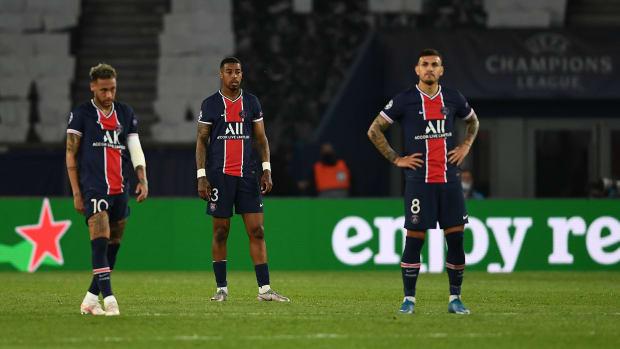Man City rebounded well from a rough first half, dealing PSG a significant blow as both well-funded powers seek a first Champions League title.
Even by the standards of Paris Saint-Germain, this was a spectacular meltdown. At halftime of Wednesday's Champions League semifinal first leg it led and had dominated to such an extent that Manchester City was probably relieved to go into the dressing room only 1-0 down. But Man City pressed harder and higher in the second half and PSG disintegrated. A 2-1 win doesn’t guarantee Man City’s progress to a first Champions League final, but it has a clear advantage, not just in terms of the scoreline but in the way PSG lost discipline.
City and PSG were two clubs who emerged relatively unscathed from the Super League fiasco. City did sign up, but it never seemed entirely committed and was the first club formally to withdraw. PSG, meanwhile, refused the invitation and its president, Nasser Al-Khelaifi, wound up as the new chairman of the European Club Association. But to portray either club as the savior of the game would be misleading; it is the existence of clubs fueled by petro-wealth that has provoked the present crisis as the traditional elite have found their hegemony challenged by resources almost beyond comprehension.
PSG didn’t oppose the Super League, and City was skeptical about it, not through any romantic vision of the community function of football but because the present situation suits them fine. They are not in the game to make money but to enhance the reputations of their owners—a reputation that, it rapidly became clear, would have been severely damaged by signing up to the Super League.
History may view the final weeks of April this year as highly significant. Sheikh Mansour took City over in 2008, QSI bought PSG in 2011, yet neither has landed the Champions League prize it covets. Until last season, neither had even reached the final. But for the sides to meet in the semifinal guarantees one reaching the final, perhaps to face another petro-club in Chelsea; coming the week after the Super League proposals, which may come to be seen as a last throw of the dice from the traditional elite, this could be the moment at which the stranglehold of the traditional elite is finally broken.

Whatever unease may be felt about how the teams are funded, the football they produced was stunning. Both these sides have made a habit of blowing it in the big occasions, but PSG this season, for all its struggles in the domestic league—or perhaps because the fight at home has made it sharper—has been excellent since Christmas in the Champions League.
The thought had been it would rely on hitting City on the break, using the pace and intelligence of Kylian Mbappé, Neymar and Ángel Di María, but instead it attacked City from the opening whistle, and City, initially, failed to deal with it. The opening goal may have come from a corner, with Marquinhos escaping Ilkay Gündoğan to head in Di María’s superb delivery, but it was the result of intense pressure. This is not a City side used to being attacked, and it did not deal with it well, certainly in the first half.
This was not a team selection like the one against Lyon last season or against Liverpool at Anfield in 2018, but yet again there was a sense that Pep Guardiola’s attempt to tweak his system to combat the opponent had served mainly to undermine his own side. A feature of City, of all Guardiola sides, is the way the fullbacks push on, but early on here João Cancelo and Kyle Walker stayed deep. That isn’t necessarily a problem, but when City operates without a recognized striker, it needs players high up the pitch to create angles. Without that, City was largely toothless and repeatedly lost possession cheaply, allowing PSG to keep the pressure on.
When City did press, it troubled PSG, but for too much of the first half, it seemed wary of doing so. In the second, it did play much higher and as a result was able to dominate possession. The game settled into the pattern that had been widely expected, with PSG defending deep and in numbers and looking to spring Mbappé on the counter. City struggled to create clear chances, and when it did equalize after 65 minutes it was a freakish strike, with Kevin De Bruyne’s floated cross evading everybody and bouncing in at the back post.

And with that, the worst of PSG was suddenly on show. Under pressure, it lost discipline. Phil Foden was needlessly fouled by Idrissa Gana Gueye. Leandro Paredes was needlessly booked for kicking the ball away. And then the PSG wall split in two as Presnel Kimpembe and Paredes turned their backs for the decisive goal. Perhaps City was fortunate that Riyad Mahrez’s free kick hit the precise gap in the wall they left, but it was sloppiness that allowed it to happen. Keylor Navas was unsighted and helpless.
The tale of petulance continued. Neymar was booked for a late challenge. Gueye was sent off for a horrendous foul on Gündoğan. Suddenly there was the familiar theater every time a City player made a challenge, the howls of pain, the surrounding of the referee. This was a team that knew it had been outplayed seeking any means to gain an advantage.
In the end, City could easily have added a third, but given how the first half had gone, 2-1—and holding Mbappé without a shot—was impressive enough. It knows now that PSG does not handle its pressure well and that, if it needs to, it can keep the ball away. In its first semifinal under Guardiola, City is now within touching distance of a first final.
More Soccer Coverage: